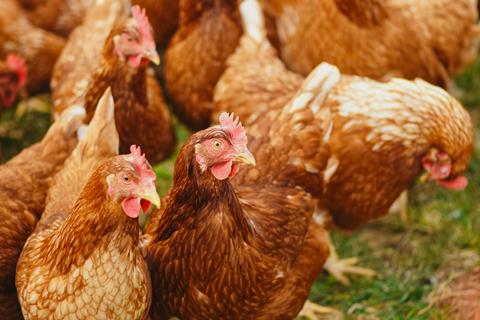The British Poultry Council (BPC) has hit back against a recent “Frankenchicken” pressure campaign, after letters were sent to 1,600 chicken farmers across the UK.

The letters were sent out by The Humane League (THL) after a legal challenge launched by THL UK claimed that farming animals who suffer due to their genes is unlawful – regardless of profitability.
The Humane League told farmers that the so-called “Frankenchickens”, which are bred to grow very big, very quickly, grew from chick to slaughter weight in 35 days on average, and told farmers that they may be breaking the law by farming them.
However, the BPC told members that there was no legal ruling against the use of conventional breeds or current production practices.
It said the letters, which were also sent to poultry producers Avara, Cranswick, Pilgrim’s Europe and 2 Sisters, were “designed to alarm and intimidate, spreading fear and confusion despite the clear legal outcome and lack of any basis for concern”.
“Misrepresenting the judgement to stoke fear and confusion does a disservice to everyone working to raise standards and have serious conversations about welfare.”
BPC
In an email sent out to BPC members, the body stated: “A pressure campaign designed to intimidate farmers and manufacture headlines is not in the interest of animals, the public or responsible food production. The Court of Appeal did not uphold The Humane League’s case and denied their appeal.
“This is not a grey area. There is no ruling against current practices and no grounds for suggesting otherwise. Misrepresenting the judgement to stoke fear and confusion does a disservice to everyone working to raise standards and have serious conversations about welfare.”
It highlighted that the Humane League’s appeal against the Department of Environment, Food and Rural Affairs (Defra) was denied by the Court of Appeal in 2024, with no legal ruling against the use of conventional breeds or current production practices.
BPC went on to say that the Frankenchicken claims were “inaccurate and misleading” as the term oversimplifies the complexity of animal welfare, distracts from serious, evidence-based discussions about responsible food production and reduces a nuanced topic to a “catchy but misleading soundbite”. It stated that the language “undermines the genuine efforts being made by farmers, scientists and veterinary experts who work to improve animal welfare”.

BPC chief executive Richard Griffiths said: “There has been no legal ruling against the use of conventional breeds and nothing to suggest that British poultry meat production, as it stands, is unlawful. The Court of Appeal denied the Humane League’s appeal and made clear that welfare decisions sit within the remit of the competent authority - in this case, Defra. The Court recognised welfare as a complex issue influenced by genetics, husbandry, and environment. Good practice remains key, and that is something British poultry meat producers take very seriously.
“British poultry producers operate to some of the highest welfare standards in the world, with over 90% of production assured under Red Tractor. The derogatory terms used by NGOs are misleading and undermines evidence-based progress in welfare and sustainable food production.”















